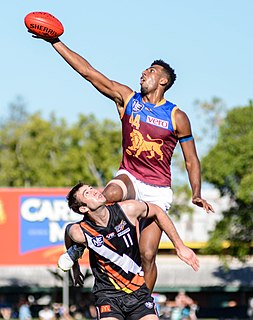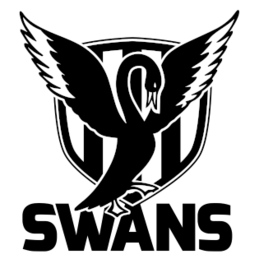
The Perth Football Club, nicknamed the Demons, is an Australian rules football club based in Lathlain, Western Australia, currently playing in the West Australian Football League (WAFL). Representing the south-east area of the Perth metropolitan region, the club currently trains and plays its home games at Lathlain Park, having previously played at the WACA Ground between 1899 and 1958 and later in 1987 and 1988.
Keith Nichol Slater is a former Western Australian and Australian cricketer and West Australian Football League (WAFL) player.
Australian rules football in Western Australia is the most popular sport in the state.

Charlie Tyson was an Australian rules footballer who played with Collingwood and North Melbourne in the Victorian Football League during the 1920s.
Phillip Michael "Phil" Narkle is a former Australian rules football player of Indigenous Australian descent who played for St Kilda and West Coast in the Australian Football League (AFL) and Swan Districts Football Club in the West Australian Football League (WAFL) during the mid-late 1970s and early 1990s. Younger brother of Keith Narkle who also played for Swan Districts, Phil generally played on the wing position. Regarded as a highly skilled and determined footballer with tremendous pace, Phil was perfectly suited to the wing position where he could turn defence into attack.
Ray Montgomery was an Australian rules football umpire. Montgomery umpired in the West Australian National Football League and the Victorian Football League.
The 2008 West Australian Football League (WAFL) Grand Final was the culmination of the 124th season of the premier Australian rules football league in Western Australia. It was played at Subiaco Oval on 20 September 2008 and was won by the Subiaco Football Club, who defeated the Swan Districts Football Club by 57 points.
James Seabrook Everett was an Australian rules footballer who played with West Perth in the West Australian Football League (WAFL).
Adolphos Heinrich Julius Carl "Dolph" Heinrichs was an Australian rules footballer who played with East Fremantle and North Fremantle in the West Australian Football Association (WAFA). He also represented the Western Australian cricket team in two first-class cricket matches.
The Fremantle Football Club was an Australian rules football club based in Fremantle, Western Australia, that played in the Western Australian Football Association (WAFA) from 1886 to 1899. The club was known as the Unions Football Club from 1882–89.

Stephen J. Coniglio is a professional Australian rules footballer playing for the Greater Western Sydney Giants in the Australian Football League (AFL). Drafted with the second pick in the 2011 AFL National Draft. Coniglio made his debut for Greater Western Sydney in the first round of the 2012 season, and was later nominated for the 2012 AFL Rising Star award.
The 1934 WANFL season was the 50th season of the various incarnations of the Western Australian National Football League. Following upon numerous unsuccessful attempts to revive Midland Junction during the 1920s, Bassendean-based Swan Districts were admitted to the competition. The black and whites were more competitive than previous new clubs owing to the presence of a number of players with previous WANFL experience, including Fred Sweetapple from West Perth, captain-coach “Judda” Bee from East Fremantle and Nigel Gorn from South Fremantle, but after five promising campaigns were to endure nineteen open-age seasons without once winning as many matches as they lost.
Walter "Wally" Watts was an Australian sportsman, best known as the oldest player to have played a senior game in the West Australian Football League (WAFL).
The 1980 WAFL season was the 96th season of the West Australian Football League in its various incarnations.
The 1929 WAFL season was the 45th season of the West Australian Football League in its various incarnations.
The 2008 WAFL season was the 124th season of the various incarnations of the West Australian Football League, and was completely dominated by Subiaco, who not only recorded their first hat-trick of premierships but achieved a dominance over the rest of the league unrivalled in a major Australian Rules league since Port Adelaide in the 1914 SAFL season. The Lions lost once to eventual Grand Final opponents Swan Districts by the narrowest possible margin, and were previously generally predicted to achieve an undefeated season, being rarely threatened in their twenty-one victories. They finished seven-and-a-half games clear of second-placed West Perth, and convincingly won the Grand Final after trailing early.
The 1938 WANFL season was the 54th season of the Western Australian National Football League, and saw Claremont, under champion coach Johnny Leonard who had transferred from West Perth, win its first premiership after losing two Grand Finals and drawing the first one this season. The blue and golds were to win the following two premierships before a long period near the foot of the ladder after Claremont Oval was gutted by a fire in 1944.










